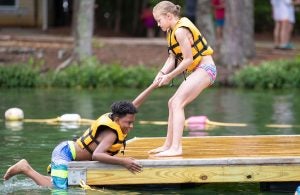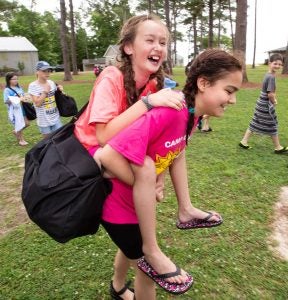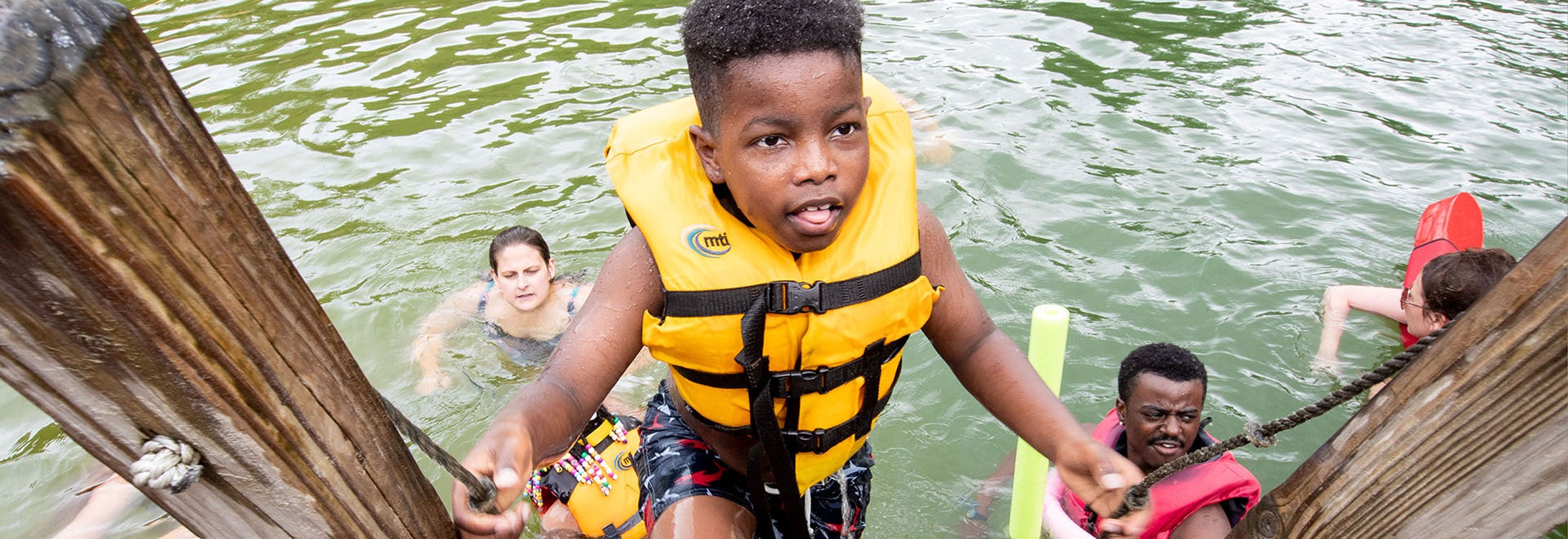CAMP RAINBOW AND CAMP HOPE
ECU hosts camps for children with cancer, hemophilia and sickle cell disease
Memphis Gautier sometimes can’t do things that most other kids his age take for granted, such as going to summer camp.
The 11-year-old Calypso, N.C. resident has severe hemophilia A, a rare disorder in which the blood does not clot normally, causing those who have it to bleed severely from even minor injuries.
However, thanks to pediatric hematology/oncology staff from ECU’s Brody School of Medicine – as well as the generosity of a host of donors and volunteers – Gautier had the opportunity to spend a week swimming, boating, doing archery and many other staples of a traditional summer camp.
“I get to do what normal campers would do, except on Tuesdays and Thursdays when I have to do my medicine,” said Gautier, who learned how to independently administer his intravenous medication. “It’s amazing, because you can spend some of the time with people who may have the same difficulties as you.”

A member of Camp Rainbow helps a fellow camper get back up on a floating platform during a swim at Camp Don Lee.
Camp Rainbow and Camp Hope are weeklong sleepover camps at Camp Don Lee in Arapahoe that are offered free of charge annually to children with cancer, hemophilia and sickle cell disease. The campers receive 24-hour medical care from their ECU physicians and nurses throughout the week.
In addition to the fun activities, the campers also take part in educational activities that help them learn more about their diseases, how to stay healthy and, for the older campers, how to transition from pediatric care to adult care.
“We help show them how to live better with their diagnoses,” said Jacque Sauls, the director of the camps and a child life specialist in Brody’s pediatric hematology/oncology section.
Camp Rainbow began in 1982 as a single-day event at a local park after a pediatric patient told an ECU physician that they couldn’t attend summer camp because they had cancer, Sauls said.
The camp relocated to Camp Don Lee in 1985 and Camp Hope was created in 1991 to include children with sickle cell disease, a blood disorder that puts them at a higher risk for stroke, blindness, pulmonary hypertension, organ damage and other painful and life-threatening complications.
The camps initially operated independently but were combined several years ago due to a lack of funds.
“We have a host of community partners who make camp possible,” Sauls said of the $1,000-per-camper cost for the camps that are funded by donations. “But we do have a waiting list of children who we just didn’t have the funding and the space to bring to camp this year, so we certainly could use a lot more community partnerships and community support.”

Camp Rainbow member Rylie Owens, 8, laughs as Harper Dowdy carries her on her back as they make their way to the sailboats at Camp Don Lee.
Because for the children who are able to attend the camps, Sauls said, it is an opportunity to build lifelong friendships with other children with similar health conditions.
“We have campers who have known each other since they were 5 or 6 and come back every year, and now are volunteers together,” she said. “They have a Facebook group that they communicate with each other with throughout the year. And if one of them is in the hospital, many of their camp group will try to come visit. It really means a lot to the camp community.”
Kinston resident Candice Howard has been coming to Camp Hope since she was 5 years old. The 20 year old is now a volunteer counselor.
“Coming back and being able to share my experiences with my group and even the little kids is amazing,” said Howard, who has sickle cell anemia. “It’s nice to know that you’re not alone, especially when you’re so young.”
“A lot of times we try to hide our sickness when we’re back home from our classmates and stuff. But here, you can really be yourself. Everybody is taking medicine and everybody feels bad sometimes,” Howard added. “That was my always favorite part, knowing that you’re not alone and nobody’s going to judge you for being sick because we all have some kind of illness.”
Brennan Hill, also of Kinston, said he has been coming to Camp Hope since he was in kindergarten because of the comforting environment it creates for the campers.
“For people who don’t know what sickle cell is and when I tell them that I have sickle cell, they feel like it’s contagious. And they feel like I really can’t move or that I can’t do anything on my own,” said Hill, 18. “So when I’m here, they understand what I go through and they know that I can do this and I can do that.”
When asked what his favorite part of camp is, Hill – who also wants to volunteer as a counselor in the future – did not name any traditional camp activities.
“It’s the love. The friendships. The relationships,” he said. “It’s just the caring, how caring people are.”
–To make a donation to help a chronically ill child attend Camp Rainbow or Camp Hope, contact Jacquelyn Sauls at saulsj@ecu.edu or 252-744-3304.
